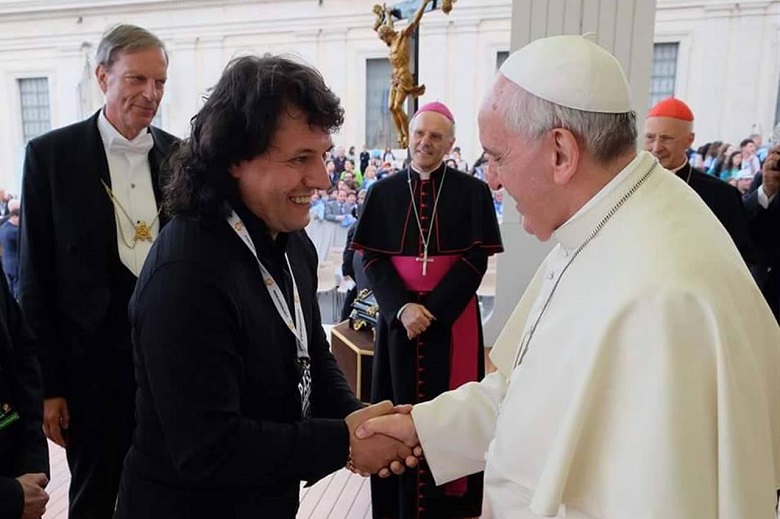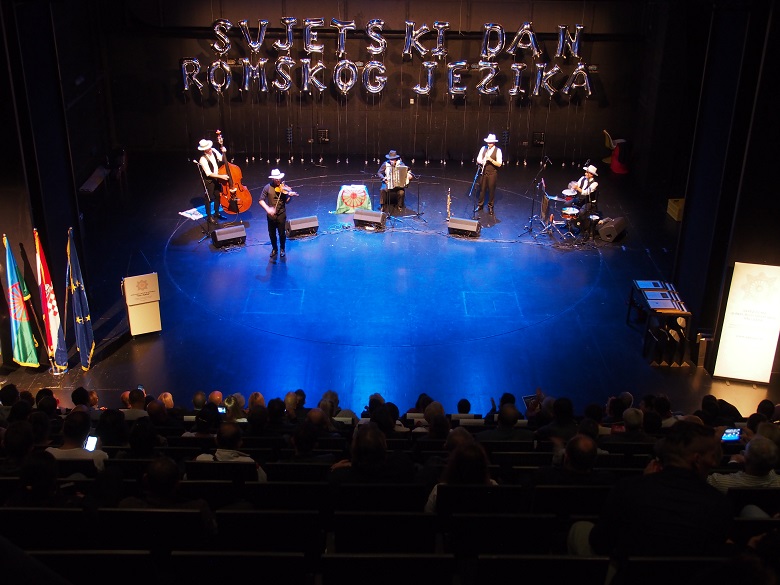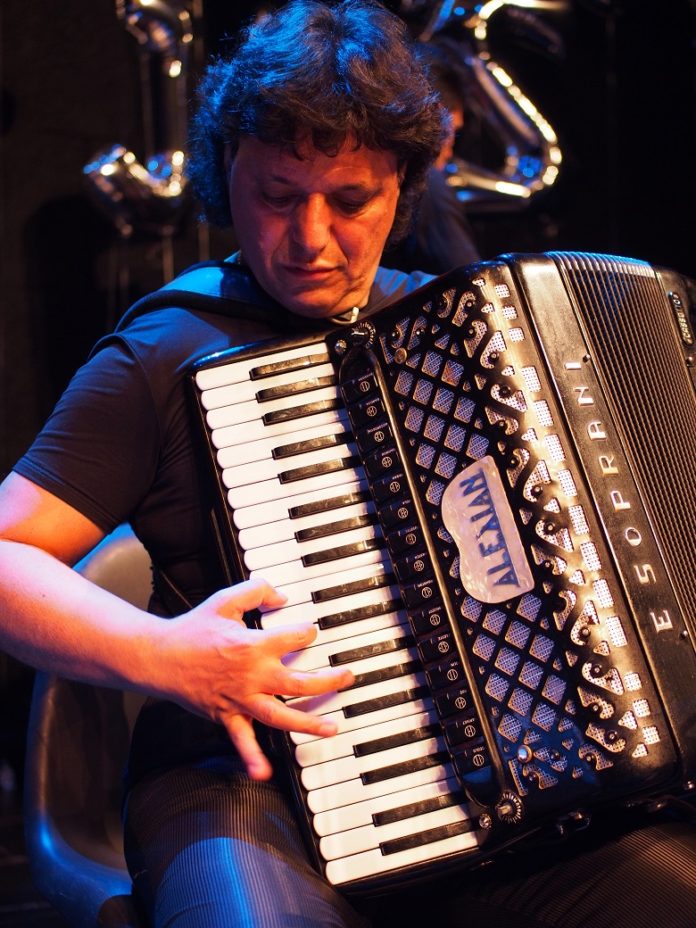Alexian Santino Spinelli would describe himself as an artist and activist, patriot of humanity and Rromani culture. Alexian is his artistic name linked to his musical and artistic career; however Santino Spinelli is a professor.
He proudly speaks of his roots dating back six centuries ago. Then a group of Rroma from the Byzantine Empire came to Italy and settled in Abruzzo, the region of central Italy. At the time of the Kingdom of Naples in which documents for expulsion purposes were issued on a daily basis, the Rroma, Spinelli’s ancestors, were afraid of exile, even though they had lived in those areas for decades. They therefore accepted the offer of a local master from the influential Spinelli family from Naples to take over his last name in order to protect themselves. It was a demonstration of good will and help to fellow citizens, and other ancient Italian families, such as Berlingeri and del Duca did the same.
Spinelli’s musical career, of nearly thirty-five years, is very impressive. He started playing as a child and did not even dream that one day he would perform on a stage as big as a football stadium and that his fans would wait in a four kilometers long queue. He has held over 3,000 concerts all over the world, bringing together fifty-four professional musicians from various parts of the world and organized the Greater Europe Peace Orchestra. When describing this project Santino said:
“Europe needs the breadth. We are against discrimination of any kind. Every man, every culture and religion must be respected. In democratic systems, everyone must have their place in society. With this Orchestra I want to create a unique European Rromani style that does not exist currently in Europe. Rromani music which is regionally represented has its own style, for example in the Balkans, in France or in Spain. “

Santino Spinelli teaches students about the diversity of Rromani music styles and its development in six directions (Oriental, Balkan, Mediterranean, Eastern European, Western European and South American). He points out that each of these directions comprises of sub-styles that accompany the evolution of music. There are also three ways to play that music – one for parties when Rroma perform for non-Rroma to make a living, second is a professional way when performing commercial music for television, radio or theater, and the third way of performance is an authentic performance when they play for themselves.
“Different styles of Rromani music can be mixed to create something new, at European level. Currently there is only a local folklore style. Similar thing happened to Beethoven and his nine symphonies. He was born in Germany and inspired by German style, but it is world music, universal for all of us. We the Rroma have to create this universal European Rromani music that Europeans can understand, and the Rroma feel like their own. “
In June 2012 Spinelli sang the “Lord’s Prayer” in Rromani language to the Pope Benedict XVI on the occasion of the International Day of Families in front of eight hundred thousand people present. In October 2015, together with the Alexian Group, he performed several of his compositions for the Pope Frances at the national television.
“Family is the most important component in my life. When we performed in front of the Pope, I felt a sense of emotion and brotherhood. This is important not only for me personally but also for the idea I present – through Rromani art and culture. “
Spinelli is very active in the struggle for the rights and the position of the Rroma, especially in Italy where he lives. He is the promoter of the idea of introducing 4th and 5th of October as Rromani Culture Days since the first monument to Rromani victims in Italy was officially revealed on these days. The monument was erected in the Park of Memories in Lanciano, a work of sculptor Tonino Santeusani, and is the second largest monument to the Rromani victims of the Second World War in Europe. The largest monument was erected in Berlin in order to commemorate the Sinti and Rroma murdered under National Socialist rule during the Genocide. The words of the poem “Auschwitz” by Santino Spinelli are written around the edge of the water basin.

Spinelli also points out that in Italian schools children do not have the opportunity to learn about genocide over Rroma, and the Italians do not know what Samudaripen is, unlike the Hebrew concept Shoah with which they are well acquainted. He considers that it is necessary to raise public awareness in this case, but also in the case of a Rromani language that is not represented in the group of thirteen officially recognized historical language minorities by the law in Italy.
“Such a form of discrimination is devastating because language is the first step towards identity. If the language is not recognized then you do not want its speakers either. That is why many Rromani families do not speak Rromani language anymore because discrimination leads to assimilation. We want to be Italians, but with our language and culture – Italian Rroma. “
Giving proofs for his statement that the Rroma have been unprotected on the political scene in Italy, Spinelli cites scandalous statements by Italian Interior Minister Matteo Salvini about the census of Rroma and regretting that they would have to keep the Italian Rroma because they could not expel them.
“He’s a racist and that’s his problem, not ours. But, the point is that his problem has become our problem. He does not know anything about Rromani culture and the Rroma. Wishing to build his career on other people’s issues he discriminates distorting reality.”
However, Spinelli emphasizes that he is proud of the Rroma, because they do not keep silent, but organize themselves, and despite the support the media provides to such statements and ideas of those in a position of authority, they protest and send their messages in a variety of ways, and certainly through music.












